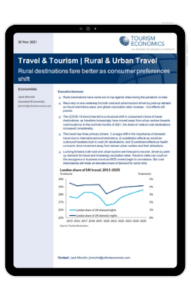Research Briefing
| Dec 3, 2021
Rural travel destinations fare better as consumer preferences shift

The COVID-19 shock has led to a structural shift in consumers’ choice of travel destinations, as travellers increasingly have moved away from urban centres towards rural locations. In the summer months of 2021, the share of visits to rural destinations increased considerably.Access this report to learn about:
- Greater levels of domestic travel have led to increased travel to rural areas. As governments introduced strict international travel restrictions to curb the pandemic, the impact of the collapse in levels of international arrivals fell more heavily on cities, which are more reliant on international visitors.
- Consumer preferences have shifted from urban centres towards rural locations. Consequently, domestic travellers constituted a larger share of total levels, and, with rural travel largely reliant on domestic visitors, rural destinations were more resilient against severe shocks to international arrivals
- Share of domestic visits to rural destinations increased from 51% to 59% between 2019 and 2021. As a result of these processes, we have seen the UK share of domestic visits to rural destinations increase by eight percentage points from 51% in 2019 to 59% in the summer of 2021.
Tags:
Related Services

Post
US Key Themes 2026: Exceptionalism amid fragmentation
US exceptionalism is alive and well, and that won't change in 2026.
Find Out More
Post
Global Key themes 2026: Bullish on US despite AI bubble fears
We anticipate another year of broadly steady and unexceptional global GDP growth, but with some more interesting stories running below the surface.
Find Out More[autopilot_shortcode]
